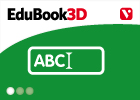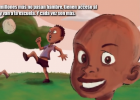Cargando...
Recursos educativos
-
Nivel educativo
-
Competencias
-
Tipología
-
Idioma
-
Tipo de medio
-
Tipo de actividad
-
Destinatarios
-
Tipo de audiencia
-
Creador
Lo más buscado
- Percepción visual
- Letras T
- fichas matemáticas
- La República romana
- El Egipto faraónico
- Guía interactiva de minerales
- Aprender a contar
- Letras F
- Actividades de lenguaje
- Actividades didacticas
- Día mundial del agua
- Experimento de Miller
- Objeto digital de aprendizaje
- Filosofía de la matemática
- Eras geológicas
-

End-of-unit activities - Medieval Cities
EduBook Organización
- 6165 visitas
In the 12th and 13th centuries, a period of economic growth led to the rebirth of cities. Cities became important centres of artisan activity and trade. Palaces, cathedrals and markets were built in the…
-

Autoevaluación 2 - La Prehistoria
EduBook Organización
- 6077 visitas
Indica qué afirmaciones sobre las características de los periodos prehistóricos son verdaderas y cuáles son falsas: La producción de alimentos se inició en el Creciente Fértil. La cerámica…
-

Antes de empezar - Las primeras civilizaciones: Mesopotamia y Egipto
EduBook Organización
- 3 lo usan
- 5445 visitas
Objetivos didácticos Identificar y localizar cronológicamente las primeras civilizaciones urbanas. Conocer la organización social y económica de las primeras ciudades-Estado y los primeros…
-

End-of-unit evaluation - Art in the 19th century
EduBook Organización
- 6032 visitas
The end of the 18th century marked a transition from Rococo art, which embodied the aesthetics of the Ancien Régime, to neoclassicism. Neoclassicism was based on the classical art and culture of…
-

End-of-unit activities - Art in the 19th century
EduBook Organización
- 6026 visitas
The end of the 18th century marked a transition from Rococo art, which embodied the aesthetics of the Ancien Régime, to neoclassicism. Neoclassicism was based on the classical art and culture of…
-

Check. A bipolar world: the Cold War and decolonisation (1945-1991)
EduBook Organización
- 5998 visitas
Remember what you have studied in this united and answer the questions: Why were two opposing blocs formed after the Second World War? What was the Cold War? What was peaceful coexistence? What factors…
-

Verdadero/falso. Cultura y arte ibéricos
EduBook Organización
- 6000 visitas
Indica si son verdaderas o falsas estas afirmaciones: Los alfareros ibéricos no conocían el torno. Los iberos conocían la escritura y tenían su propio alfabeto. Las esculturas llamadas damas, como…
-

Verdadero/falso. "Lazarillo de Tormes"
EduBook Organización
- 3 lo usan
- 5343 visitas
Indica si estas afirmaciones sobre el Lazarillo de Tormes son verdaderas (V) o falsas (F): El protagonista, Lázaro, narra su propia vida. Lázaro es hijo de padres con honra. El protagonista se vale de…
-

Complete. The formation of opposing blocs
EduBook Organización
- 5974 visitas
Complete these sentences about the formation of opposing blocs with the missing words: After the Second World War, the Yalta and Conferences divided Europe into distinct areas. The two represented…
-

África en positivo
Cristina Blas Docente
- 1 lo usan
- 5563 visitas
Aprovechando que la historia que nos cuenta la lectura se desarrolla en África, podemos proponer a nuestros alumnos ver el vídeo sobre el continen-te africano que encontramos en esta página web. Se…
Te estamos redirigiendo a la ficha del libro...












